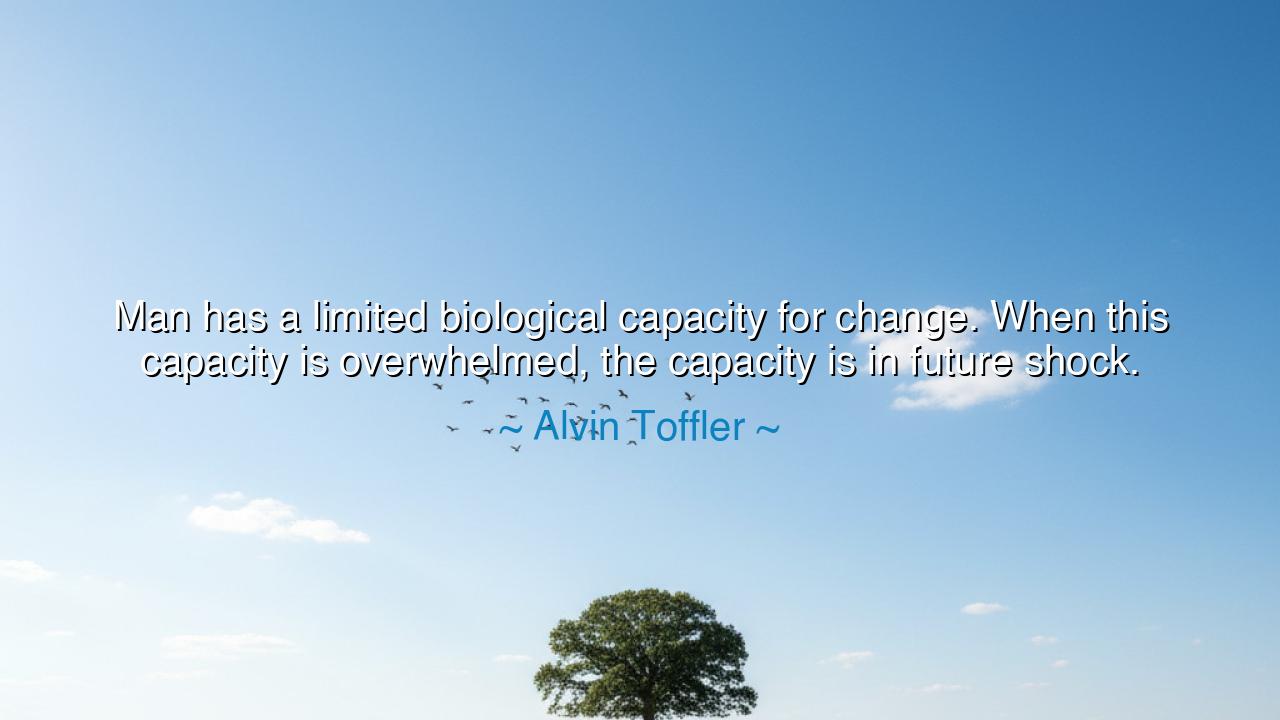
Man has a limited biological capacity for change. When this
Man has a limited biological capacity for change. When this capacity is overwhelmed, the capacity is in future shock.






On the Burden of Change and the Age of Future Shock
When Alvin Toffler, the prophet of modern times, spoke the words, “Man has a limited biological capacity for change. When this capacity is overwhelmed, the capacity is in future shock,” he was not merely describing a theory — he was issuing a warning to the generations racing toward the horizon of their own invention. His words come from the age of machines and silicon, of circuits and steel, but their wisdom reaches back to the dawn of humanity itself. For they speak of a truth written into the flesh and bone of humankind: that while the world can evolve faster than the blink of an eye, the soul of man moves more slowly, with the rhythm of the earth and the beating of the heart.
Toffler’s “future shock” is not a storm of machines or data, but a storm of the mind — a condition of confusion and dislocation, when the speed of change outpaces the human spirit’s ability to adapt. In ages past, change arrived like the tide: slowly, predictably, shaping the shore across generations. But in the age of Toffler, and even more so in ours, change comes like lightning — new inventions rise before the old have faded, cultures transform overnight, and the present becomes a stranger before we have learned its name. The mind, overwhelmed by such velocity, trembles. The heart grows weary. This trembling — this disorientation of the human spirit — is what Toffler called future shock.
Yet this insight is not new, though Toffler gave it a name. The ancient philosophers of Greece, the mystics of the East, the elders of every tribe have all known that man is not an infinite vessel. Heraclitus, who said that one cannot step into the same river twice, also warned that constant change could erode the soul if wisdom did not anchor it. Toffler, standing at the edge of the technological age, saw that the river had become a flood — and that humanity, unprepared, was being swept away. He saw that our biological and emotional nature — shaped over millennia for stability, community, and rhythm — was ill-equipped for the ceaseless turbulence of modern progress.
Consider the fate of those who lived through the Industrial Revolution. Entire generations were torn from the soil, their hands once shaped by plows now chained to iron machines. Villages became cities; traditions dissolved; the night sky turned to smoke and flame. Many found prosperity, but many more found despair. Families fractured, hearts hardened, and a strange new loneliness settled over humankind. The world had leapt forward — but the spirit of man lagged behind, bewildered by its own creation. That was an early taste of what Toffler foresaw as the universal condition of future shock.
And what of our own age — the age of digital fire and endless connection? We scroll, we rush, we chase the next invention as if it were salvation. Yet in our haste, we feel a growing emptiness, a fatigue of the soul. Toffler’s prophecy has come true: our capacity for change has been exceeded. We adapt, but without peace; we learn, but without depth. We live in a perpetual storm of novelty, forgetting that the human heart was not built for infinite acceleration. We are creatures of rhythm, not speed — of continuity, not chaos.
But Toffler’s warning is not a message of despair — it is a call to wisdom. For if our capacity for change is limited, then our task is not to resist all change, but to guide it, to master it, to move with awareness. Just as the sailor cannot stop the wind but can set his sails wisely, so too must modern man learn to navigate the storm of progress. We must choose what to embrace and what to leave behind, lest we become slaves to our own inventions. To remember this balance is to remember our humanity.
The lesson, then, is this: slow down the heart, even when the world runs fast. Choose stillness amidst motion, reflection amidst noise. Make time for the eternal — for silence, for nature, for the faces of those you love. Let change serve your soul, not consume it. For a man who learns all the world’s secrets but loses his peace has gained nothing.
Thus, in the words of Alvin Toffler, let us remember that the future must be approached not as a flood to be endured, but as a river to be guided. The wise do not drown in the waters of change — they learn to swim in rhythm with time. And when the tide rises too high, they return to the shore of the present moment — where life, steady and ancient, still beats in the pulse of the human heart.






AAdministratorAdministrator
Welcome, honored guests. Please leave a comment, we will respond soon